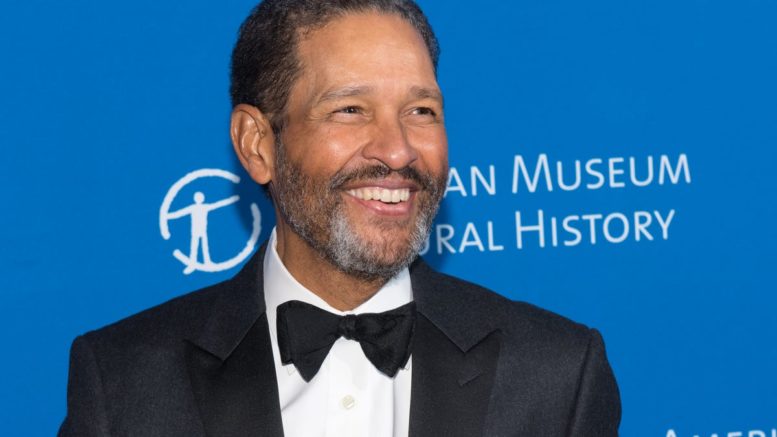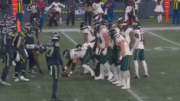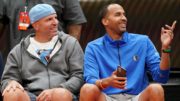It’s always been called the idiot box. But, this year, networks and viewers took sports television to a new low where common sense wasn’t required. It’s been a hard watch.
HBO’s Real Sports is no more. After 29 years, the iconic sports television show ended this week. One of the last major “smart” shows about sports is gone, in a year that’s been filled with proof that “dumb” shows about sports are the new thing.
I know it. You know it. And Bryant Gumble does, too.
“I think the show is going to be remembered as a show that tried to do sports journalism the right way and tried to treat fans, athletes, and sports with a degree of respect,” he told the Washington Post’s Ben Strauss in a recent interview.
Respect is the thing that’s been missing in all of this. Somewhere along the lines audiences lost respect for the work that journalists do. They don’t want truth, context and nuance anymore. They just want to be entertained by the viral moments that athletes on these shows create.
“You never say never, but I don’t foresee it,” said Gumble when asked if he thought there would ever be another show like his. “First, it was a very expensive show to do. Second, most outlets have some kind of a contractual relationship with a sports league that would prevent them from doing an honest kind of show. I also think the public appetite has changed. We did long-form video pieces. The public is conditioned to expect things to be brief.”
A huge part of this business is giving the audience what it wants. The past year has been proof that audiences don’t desire sports journalism like they used to.
“It puts a lot of onus on the fan, the viewer, the reader to satisfy their own curiosity. Because, quite frankly, I grew up in a time when if a guy ran afoul of something or had a problem, his only way out of it was to be seen sitting for a serious interview with somebody who was equally serious,” Gumble said. “Now that’s no longer the case. Now if a guy gets a DUI or gets in trouble with his team, he goes on the league’s network, answers a couple of softball questions, and next time he’s asked about it, he says he addressed it. I’m not saying there’s a bad guy in this, but times have changed.”
That same sentiment and feeling has been noticed by others in the industry.
“But acting like former athletes are journalists and interviewing each other is the sad part,” Rob Parker told Deadspin in August when I broached this subject. “That’s where fans get the short end of the stick. You almost never hear a hard question when all players are involved.”
At the time, Skip Bayless’ new co-hosts for FS1’s revamped Undisputed had been announced as even more ex-athletes were replacing journalists on TV. His lineup included four former athletes, one white female pseudo-reporter and a rapper. The days of serious topics in sports being investigated and discussed are gone. The people with the bandwidth and background to speak on them are being pushed out.
“What frustrates me are things like this Northwestern hazing story that came around,” Bomani Jones told Deadspin in that same story. “I remember the Penn State scandal, and I got so tired of getting on television and talking about that doom and gloom topic because it just wasn’t any fun. But, I look up at this Northwestern hazing thing, and this story is a really big deal when you think about it. And I haven’t seen very much deep discussion on major platforms about the larger issues that are at play there. I feel like 10 years ago, my telephone would have been blowing up. Now when these bigger stories happen, it’s CNN and MSNBC. It’s not anybody related to sports.”
Look around. When was the last time you heard anything about Northwestern? One of the biggest stories in all of sports just came and went, and there hasn’t been much follow-up on the situation, as it felt like news shows were more invested at the time than sports shows were.
A couple of months after the news about Bayless’ show occurred, we got another dose of bad sports TV thanks to Rodney Harrison and Donte Whitner.
“But watching that tape, man, you gotta look at this dude and say, ‘Oh, he is garbage.’ Like we should really tear him apart,” Harrison said to Kansas City Chiefs defensive tackle Chris Jones on Sunday Night Football after Kansas City defeated the Jets in Week 4, attempting to bait him into saying something bad about New York quarterback Zach Wilson.
“Dak Prescott sucks, period,” Whitner said on NBC Sports Bay Area’s 49ers Postgame Live after San Francisco beat Dallas on Sunday Night Football 42-10, in a game in which Prescott featured three interceptions from Prescott. “They talk so much about Dak Prescott being a top-tier quarterback, franchise guy. I don’t see it. I see them trying to cover up for what he lacks.”
Where’s the analysis?
What happened to all that first-hand knowledge that “guys who played the game” were supposed to give?
More often than not, it doesn’t exist. Playing the game is an advantage that athletes will always have over journalists. But, your experience is pointless if you can’t properly convey your thoughts.
The Sports Reporters are gone, and Outside The Lines is basically over, too. Before ending Real Sports, HBO got rid of Back on the Record with Bob Costas and Bomani Jones’ Game Theory. It’s almost impossible to find a sports show where conversations are valued and debates are nonessential. And if you do find some, they’re usually podcasts or broadcasted via YouTube. Here’s to hoping the industry rectifies itself at some point, and audiences appreciating sports-talk, not sports-yelling.
Original source here
#HBOs #Real #Sports #bad #world





